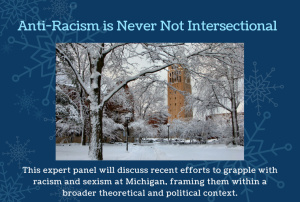Presented By: Institute for Research on Women and Gender
Anti-Racism Is Never Not Intersectional

Panelists:
-Elizabeth Cole, Faculty Associate Director, National Center for Institutional Diversity; Professor of Women's and Gender Studies, Psychology, and Afroamerican and African Studies
-Elizabeth González, Education & Training Program Manager, Spectrum Center
-SaraEllen Strongman, Assistant Professor, Afroamerican and African Studies
-Ruby C. Tapia, Chair, Department of Women's and Gender Studies; Associate Professor, English Language & Literature and Women's and Gender Studies
Moderator: Anna Kirkland, Director, Institute for Research on Women and Gender; Arthur F. Thurnau Professor, Women's and Gender Studies; Political Science, Sociology, and Health Management & Policy (by courtesy)
The racial reckoning during 2020 sparked renewed energy to address pervasive structural racism and the resulting disparate inequities and injustices impacting minoritized communities and communities of color in the US. Institutions of higher education across the nation have expressed commitments to address racism in their organizations. Similarly, many institutions across the country have sought to focus new efforts to end harassment based on sex, sexuality, and gender, yet these efforts have often operated separately from the fight to address systemic racism.
At the College of Literature, Science & the Arts (LSA) at the University of Michigan, working groups have produced both an LSA Task Force on Anti-Racism and Racial Equality report and a Preventing Sexual Harassment report in recent months. Additionally, the university commissioned reports on high-profile cases of sexual misconduct (Philbert and Anderson) and created campus initiatives in response to national conversations around anti-racism.
This expert panel will help us to understand how systems of racism and sexism support and maintain each other, discuss recent efforts to grapple with these issues at Michigan, frame them within a broader theoretical and political context and then provide suggestions on how to move from intention to action and how to enact structural change that is transformational and sustainable.
Cosponsored by: The Institute for Research on Women and Gender, the Initiative on Gender Based Violence and Sexual Harassment at IRWG, the Women’s & Gender Studies Department, and the National Center for Institutional Diversity’s Anti-Racism Collaborative
This webinar will be recorded. Please register to receive the Zoom recording.
-Elizabeth Cole, Faculty Associate Director, National Center for Institutional Diversity; Professor of Women's and Gender Studies, Psychology, and Afroamerican and African Studies
-Elizabeth González, Education & Training Program Manager, Spectrum Center
-SaraEllen Strongman, Assistant Professor, Afroamerican and African Studies
-Ruby C. Tapia, Chair, Department of Women's and Gender Studies; Associate Professor, English Language & Literature and Women's and Gender Studies
Moderator: Anna Kirkland, Director, Institute for Research on Women and Gender; Arthur F. Thurnau Professor, Women's and Gender Studies; Political Science, Sociology, and Health Management & Policy (by courtesy)
The racial reckoning during 2020 sparked renewed energy to address pervasive structural racism and the resulting disparate inequities and injustices impacting minoritized communities and communities of color in the US. Institutions of higher education across the nation have expressed commitments to address racism in their organizations. Similarly, many institutions across the country have sought to focus new efforts to end harassment based on sex, sexuality, and gender, yet these efforts have often operated separately from the fight to address systemic racism.
At the College of Literature, Science & the Arts (LSA) at the University of Michigan, working groups have produced both an LSA Task Force on Anti-Racism and Racial Equality report and a Preventing Sexual Harassment report in recent months. Additionally, the university commissioned reports on high-profile cases of sexual misconduct (Philbert and Anderson) and created campus initiatives in response to national conversations around anti-racism.
This expert panel will help us to understand how systems of racism and sexism support and maintain each other, discuss recent efforts to grapple with these issues at Michigan, frame them within a broader theoretical and political context and then provide suggestions on how to move from intention to action and how to enact structural change that is transformational and sustainable.
Cosponsored by: The Institute for Research on Women and Gender, the Initiative on Gender Based Violence and Sexual Harassment at IRWG, the Women’s & Gender Studies Department, and the National Center for Institutional Diversity’s Anti-Racism Collaborative
This webinar will be recorded. Please register to receive the Zoom recording.